Vermont’s Career Technical Education (CTE) leaders are continually advancing their efforts to ensure equity, meaningful learner engagement, and real-world readiness across the state’s career pathways. Senior Policy Associate Haley Wing led two impactful sessions at Vermont’s 2024 annual conference in Jay Peak, Vermont—a small ski town near the Canadian border that highlighted two Advance CTE resources—Using the Achieving Inclusive CTE Goal-Setting Tool and Leveraging Learner Voice to Strengthen CTE.
These sessions offered state leaders actionable insights and practical tools to take their work to the next level, showcasing how Advance CTE’s resources can help align CTE systems with learners’ needs and priorities. Throughout the conference, discussions, workshops, and panels built upon these themes, reflecting Vermont’s commitment to equity, career exploration, and fostering learner success.
This blog highlights how Vermont leaders use these tools to elevate their work, celebrates the fantastic progress across the state, and outlines promising practices for others to consider.
Session 1: Leveraging Learner Voice to Strengthen CTE
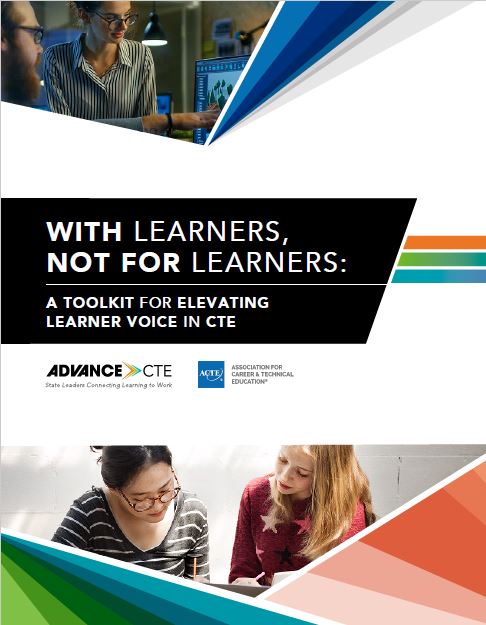 Meaningful learner engagement is critical to program improvement, equity, and inclusion across CTE programs, policies, and opportunities. Leaders across Vermont are well aware of the value of leveraging learner voice in CTE. Leaders across the conference elevated existing practices and opportunities to improve programs and learning environments and meet learners’ diverse needs using their feedback, input, and leadership.
Meaningful learner engagement is critical to program improvement, equity, and inclusion across CTE programs, policies, and opportunities. Leaders across Vermont are well aware of the value of leveraging learner voice in CTE. Leaders across the conference elevated existing practices and opportunities to improve programs and learning environments and meet learners’ diverse needs using their feedback, input, and leadership.
While the session elevated findings from Advance CTE’s Leveraging Learner Voice to Strengthen CTE technical assistance cohort built upon Advance CTE’s With Learners, Not For Learners: Learner Voice Toolkit, promising practices, and methods of meaningful learner engagement emerged from the plenary session:
- Accounting for different dimensions of diversity is critical to meaningful learner engagement. Throughout the session, leaders recognized their geographic location and the demographics typical of their state. While racial diversity is not always enabled, other equity dimensions should be accounted for to ensure learners engage in real-world work experiences to prepare them for the workforce.
- Progress over perfection; the work builds over time: CTE Center Directors across the state participated in an interactive version of the Assessments for Engaging CTE Learners from the Learner Voice Toolkit (page 35 in the toolkit). Through audience examples, it became clear that many directors are already actively fostering meaningful learner engagement. Specific actions include:
- Collaborating with learners to gather feedback on programs and make improvements;
- Integrating learner voice into decisionmaking meetings that impact their CTE experiences;
- Initiating discussions with CTE instructors to deepen and expand learner engagement across CTE opportunities.
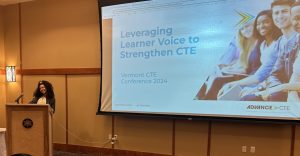 Session 2: Achieving Inclusive CTE Goal-Setting Through Data
Session 2: Achieving Inclusive CTE Goal-Setting Through Data
Incorporating and leveraging data is a critical component of CTE program improvement, especially with a focus on equity and inclusion. Advance CTE is committed to supporting leaders in accomplishing and actualizing the valuable practice of leveraging data and goal-setting to meet equity goals aligned with Carl D. Perkins Career and Technical Education Act (Perkins V) tools. Trainings like the Opportunity Gap Analysis Workshop and the Achieving Inclusive CTE Goal-Setting Tool are examples of resources for CTE leaders to support this work and development.
Leaders across Vermont are expanding their use of CTE data in earnest with the Achieving Inclusive CTE Goal-Setting Tool. During this session, CTE Center Directors discussed opportunities to leverage the tool across their centers, different ways to interpret and read the tool’s analyses, and strategies to support others in leveraging it for inclusivity and equity.
Promising Practices and Next Steps
Both sessions demonstrated that Vermont’s CTE leaders are deeply committed to fostering inclusive, equitable environments that place learners at the center. By focusing on learner voice and data-driven goal-setting, the state creates pathways for learners to succeed, regardless of background or circumstances. Leaders are actively strengthening programs and cultivating relationships that prepare learners for the workforce and future challenges.
Key Takeaways
- Equity through Action: Both sessions underscored the importance of recognizing learners’ diversity and taking actionable steps to ensure their voices shape CTE experiences. Whether through feedback loops, targeted improvements, or inclusive decisionmaking, learners are increasingly seen as co-creators of their success.
- Data as a Catalyst for Equity: Leveraging tools like the Achieving Inclusive CTE Goal-Setting Tool allows Vermont’s CTE leaders to transform data into impactful action. By identifying and addressing opportunity gaps, leaders can drive more equitable outcomes across all CTE programs, aligning with the state’s commitment to equity as outlined in Perkins V.
As Vermont’s CTE community prioritizes equity and learner engagement, the collective focus on continuous improvement will drive meaningful progress. By putting learners at the forefront and using data to guide their efforts, Vermont’s CTE leaders are setting a powerful example of how to build more inclusive and responsive programs that prepare all learners for success.
Get Involved
The conference was a reminder that advancing CTE and making it more inclusive is a continual process. As Vermont’s leaders continue to exchange ideas and collaborate, the future of CTE in the state looks promising. With learner voice guiding program development and data illuminating areas for growth, Vermont’s CTE programs are well-positioned to meet the evolving needs of both learners and the workforce.
 To learn more about Advance CTE’s resources, supports, technical assistance and/or speaking opportunities, please see this page on the Advance CTE website.
To learn more about Advance CTE’s resources, supports, technical assistance and/or speaking opportunities, please see this page on the Advance CTE website.



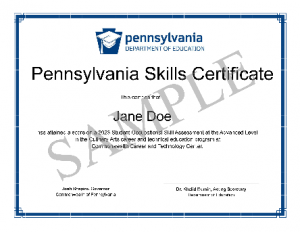 State CTE leaders utilize data as feedback to continuously improve systems, celebrate high-quality programs, and target areas for improvement. For example, the Pennsylvania Department of Education (PDE) utilizes NOCTI/NBS assessments and data for various purposes, including program evaluation, curriculum alignment, instructional improvement, professional development, and accountability. Learners meeting state-established benchmarks are eligible for the Pennsylvania Skills Certificate (PSC), recognizing individual advanced technical skill achievement.
State CTE leaders utilize data as feedback to continuously improve systems, celebrate high-quality programs, and target areas for improvement. For example, the Pennsylvania Department of Education (PDE) utilizes NOCTI/NBS assessments and data for various purposes, including program evaluation, curriculum alignment, instructional improvement, professional development, and accountability. Learners meeting state-established benchmarks are eligible for the Pennsylvania Skills Certificate (PSC), recognizing individual advanced technical skill achievement. High-quality CTE systems involve business/industry partners in verifying skills, ensuring learner assessments accurately reflect expertise. This practice not only benefits learners but also provides industry employees with an opportunity to contribute meaningfully to CTE schools and programs. As one evaluator recently summarized, “I am always willing to set time aside to work with these learners and programs, as this is the future of my industry–one that I care about and want to impact.”
High-quality CTE systems involve business/industry partners in verifying skills, ensuring learner assessments accurately reflect expertise. This practice not only benefits learners but also provides industry employees with an opportunity to contribute meaningfully to CTE schools and programs. As one evaluator recently summarized, “I am always willing to set time aside to work with these learners and programs, as this is the future of my industry–one that I care about and want to impact.” Hello! My name is Jessica (Jessi) Maddox, and I am ecstatic to be a part of the Advance CTE team as a senior policy associate. In this role I will be working directly with the upcoming cohorts of the Opportunity Gap Analysis providing customized technical assistance and peer learning opportunities to participating states. I will also collaborate with team members to enhance Advance CTE’s state policy, equity, and data and research strategies by supporting state and local sites in designing and advancing high-quality and equitable career pathways.
Hello! My name is Jessica (Jessi) Maddox, and I am ecstatic to be a part of the Advance CTE team as a senior policy associate. In this role I will be working directly with the upcoming cohorts of the Opportunity Gap Analysis providing customized technical assistance and peer learning opportunities to participating states. I will also collaborate with team members to enhance Advance CTE’s state policy, equity, and data and research strategies by supporting state and local sites in designing and advancing high-quality and equitable career pathways.
 Additional Resources can be found in the Perkins V section of the
Additional Resources can be found in the Perkins V section of the 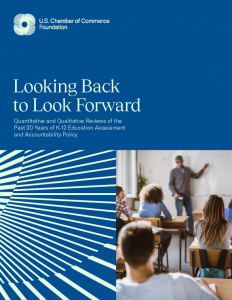 Earlier this year, the U.S. Chamber of Commerce Foundation hosted a webinar to release their new report,
Earlier this year, the U.S. Chamber of Commerce Foundation hosted a webinar to release their new report, 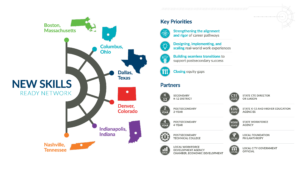
 The Attainment Network envisions an innovative education-to-workforce system that develops a diverse, talented workforce for current and future jobs, meets economic demands and sustains thriving communities. As The Network pursues this vision, their measure of success encompasses key evaluation questions embedded in equitable outcomes for learners. This includes measuring the number of diverse learners completing high-value credentials and receiving opportunities for high-wage, in-demand careers.
The Attainment Network envisions an innovative education-to-workforce system that develops a diverse, talented workforce for current and future jobs, meets economic demands and sustains thriving communities. As The Network pursues this vision, their measure of success encompasses key evaluation questions embedded in equitable outcomes for learners. This includes measuring the number of diverse learners completing high-value credentials and receiving opportunities for high-wage, in-demand careers.
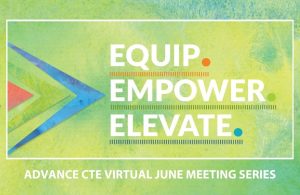 On June 22, Advance CTE hosted the third and final event in its three-part June Meeting Series. The day focused on the theme of “Elevate,” and offered knowledge about raising the profile of Career Technical Education (CTE), so that key stakeholders and the public support and engage with the field.
On June 22, Advance CTE hosted the third and final event in its three-part June Meeting Series. The day focused on the theme of “Elevate,” and offered knowledge about raising the profile of Career Technical Education (CTE), so that key stakeholders and the public support and engage with the field.  One practical tip Dennis offered: “Start your email subject line with the words ‘STORY IDEA.’” Something that simple can make him jump right to the email.
One practical tip Dennis offered: “Start your email subject line with the words ‘STORY IDEA.’” Something that simple can make him jump right to the email. 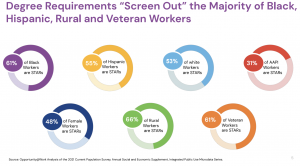
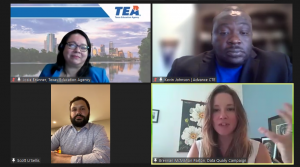
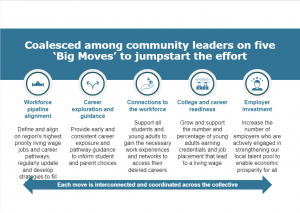 Dallas Foundation Chief Impact Officer Drexell Owusu was candid about the equity and quality of life challenges facing residents of Dallas. However, he was equally optimistic about the role that CTE can have in providing high-quality pathways to maximize recent economic growth and increase the number of young adults achieving a living wage to 50 percent within one generation. He identified five strategies that comprise the Dallas Thrives initiative to achieve this goal.
Dallas Foundation Chief Impact Officer Drexell Owusu was candid about the equity and quality of life challenges facing residents of Dallas. However, he was equally optimistic about the role that CTE can have in providing high-quality pathways to maximize recent economic growth and increase the number of young adults achieving a living wage to 50 percent within one generation. He identified five strategies that comprise the Dallas Thrives initiative to achieve this goal. 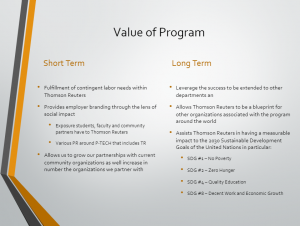 Thomson Reuters Director of Community Relations
Thomson Reuters Director of Community Relations 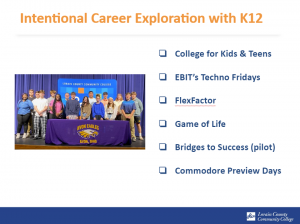 Lorain County Community College Manager of Career Technical Pathways & Programs
Lorain County Community College Manager of Career Technical Pathways & Programs 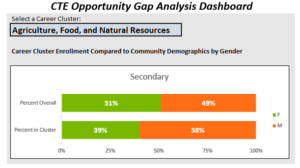 The CTE opportunity gap analysis training was piloted last summer in partnership with Minnesota State Colleges and Universities. Minnesota is organized into 26 consortia to implement the Strengthening Career and Technical Education for the 21st Century Act (Perkins V), each representing the community or technical college and school districts in their service area. Each consortium sent secondary and postsecondary representatives to the pilot workshop.
The CTE opportunity gap analysis training was piloted last summer in partnership with Minnesota State Colleges and Universities. Minnesota is organized into 26 consortia to implement the Strengthening Career and Technical Education for the 21st Century Act (Perkins V), each representing the community or technical college and school districts in their service area. Each consortium sent secondary and postsecondary representatives to the pilot workshop.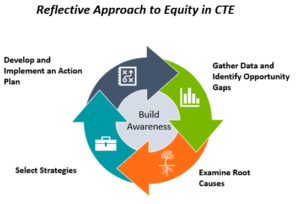 In the second session, participants reviewed their own dashboards — which they prepared in advance with data from the state office — in order to identify learner subgroups that were over- or under-represented across different CTE programs compared to the overall learner population. Participants used a fishbone diagram to identify and map underlying root causes and reviewed intervention strategies and supporting evidence to target recruitment, enrollment and inclusivity of diverse learner populations in CTE. Using this information, they began to develop equity-focused action plans. The workshop, which was aligned with Minnesota’s Perkins V professional development series, was designed to help participants center equity in their Perkins V applications and action plans.
In the second session, participants reviewed their own dashboards — which they prepared in advance with data from the state office — in order to identify learner subgroups that were over- or under-represented across different CTE programs compared to the overall learner population. Participants used a fishbone diagram to identify and map underlying root causes and reviewed intervention strategies and supporting evidence to target recruitment, enrollment and inclusivity of diverse learner populations in CTE. Using this information, they began to develop equity-focused action plans. The workshop, which was aligned with Minnesota’s Perkins V professional development series, was designed to help participants center equity in their Perkins V applications and action plans.